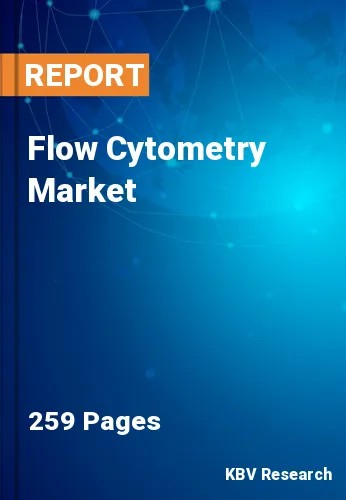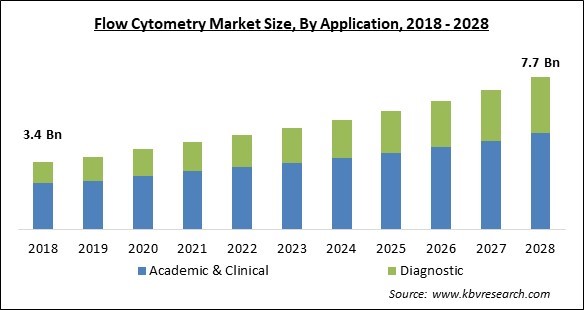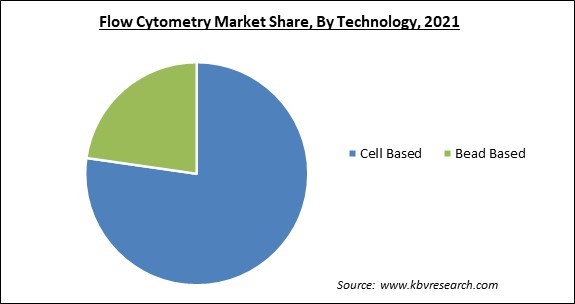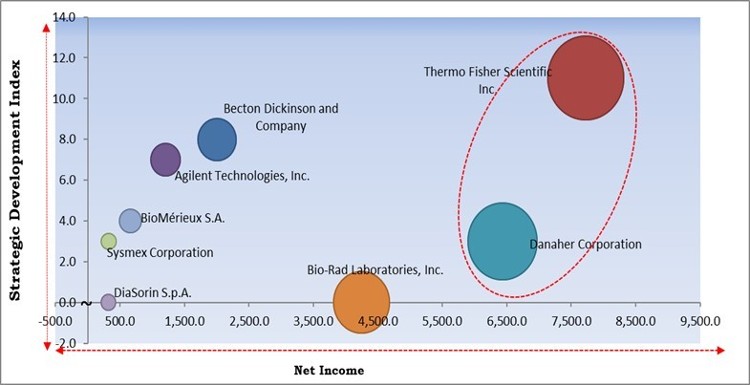
The Global Flow Cytometry Market size is expected to reach $7.7 billion by 2028, rising at a market growth of 8.3% CAGR during the forecast period.
With regard to describing and distinguishing various cell types within a heterogeneous population of cells, measuring cell size and volume, and determining the purity of separated subpopulations, flow cytometry is a commonly utilized technique. It allows the simultaneous evaluation of several parameters for an individual cell.

It is used to quantify the amount of fluorescence that fluorescently-labeled antibodies emit when they identify ligand proteins that bind to particular compounds found in cells, such as DNA and propidium iodide. Following the staining step, cells are placed in tubes or microtiter plates and incubated with unlabeled or fluorescently-labeled antibodies before being analyzed on a flow cytometer.
A laboratory test called flow cytometry is used to examine the properties of cells or particles. A sample of cells or other particles is pumped into a flow cytometer system while suspended in the liquid. In less than a minute, a computer can analyze and process about 10,000 cells. Analyzing the activation of cell surface or intracellular molecules is made easier by flow cytometry. It helps evaluate the purity of isolated subpopulations and is used to describe and characterize various types of cells across a heterogeneous cell population.
The market is being driven by increased R&D efforts by many prominent players for the creation of multicolor assays as well as cutting-edge analytical reagents. The market for flow cytometry has experienced rapid expansion as a result of the rising prevalence of chronic and infectious disorders. Typical samples range from various cell populations isolated from tissues to a cell line producing Green Fluorescent Protein.
The sample must be a single-cell suspension, which is the most important condition for effective and efficient flow cytometry analysis. This makes sure that each cell is examined separately. Cancer and immunodeficiency are two conditions that are frequently diagnosed using flow cytometry. One of the elements anticipated to propel the flow cytometry market in the coming years is the rising prevalence of certain disorders.
The COVID-19 pandemic had a favorable effect on the prospects for the flow cytometry business during the initial COVID-19 outbreak. The rising application of reagents in research and clinical trials has boosted the market share of flow cytometry reagents and therefore the use of the flow cytometry approach. For instance, in March 2020, Cytek Biosciences Inc. provided support to doctors and researchers who were examining the effects of the COVID-19 virus on human immune systems. COVID-19 patients had lower T- and B-cell frequencies than recovered donors or healthy donors.
The increasing incidence and prevalence of HIV/AIDS and cancer worldwide, the growing use of flow cytometry techniques in academic and research settings, the expansion of public-private initiatives within the fields of microbiology and immuno-oncology research, technological advancements, the increasing integration of AI platforms into flow cytometry workflows, and improvements in flow cytometry software all contribute to the market's growth. During the drug research and development procedures, flow cytometry has become a crucial technique for safety as well as exploratory objectives.
There is a rise in the number of applications of flow cytometry. Immunophenotyping is the procedure that uses the cytometer the most frequently. With the use of this method, groups of cells in a dataset consisting of blood, bone marrow, or lymph can be located and measured. These cell subsets are identified by fluorescently tagging population-specific proteins on the cell surface. Immunophenotyping aids in the clinical lab diagnosis of hematological malignancies such as lymphomas and leukemia. Additionally, in cell sorting applications, a customized flow cytometer called a cell sorter may physically separate target cells into different collection tubes. Each cell is interrogated and characterized by the cytometer as it moves through the laser.
Most end customers, including clinical laboratories, major research institutions, and pharmaceutical firms, need a lot of flow cytometry equipment to do several research projects at once. As a result, the initial cost related to the purchase and maintenance of these devices rises significantly. Budget constraints make it difficult for research and academic laboratories to purchase such tools. The total cost of the acquisition of these instruments also rises as a result of maintenance charges and a number of other indirect expenses.
Based on Component, the Flow Cytometry Market is segmented into Instruments, Reagents and consumables, Software, and Services. In 2021, the reagents and consumables segment garnered a substantial revenue share of the flow cytometry market. The innovation and distribution of high-quality assays and reagents for certain applications as well as end users' ongoing need for flow cytometry reagents are two factors that are propelling the growth of this segment.

On the basis of Technology, the Flow Cytometry Market is bifurcated into Cell based flow cytometry and Bead based flow cytometry. In 2021, the cell-based flow cytometry segment procured the biggest revenue share of the flow cytometry market. Due to the ability to assess compound activity towards molecular targets while surrounded by living cells, cell-based flow cytometry is being employed more frequently in the drug discovery process.
By the Application, the Flow Cytometry Market is divided into Academic and clinical applications and Diagnostic applications. In 2021, the academic & clinical applications segment witnessed the highest revenue share of the flow cytometry market. The growth of the segment is rapidly rising as a result of increased research into academic and clinical applications of flow cytometry. Moreover, with the increasing number of initiatives and improvements in the educational infrastructures of several countries all over the world, the utilization of flow cytometry in educational facilities is also increasing.
Based on End-User, the Flow Cytometry Market is segregated into Hospitals, Medical schools & clinical testing labs, Commercial organizations, Academic institutions, and Others. In 2021, the hospitals segment witnessed a significant revenue share of the flow cytometry market. The growing demand for affordable diagnosis of target diseases, like cancer, is one of the major factors that are propelling the growth of this segment of the market. In addition, the integration of several advanced technologies and innovations in hospitals all over the world is increasing.
| Report Attribute | Details |
|---|---|
| Market size value in 2021 | USD 4.4 Billion |
| Market size forecast in 2028 | USD 7.7 Billion |
| Base Year | 2021 |
| Historical Period | 2018 to 2020 |
| Forecast Period | 2022 to 2028 |
| Revenue Growth Rate | CAGR of 8.3% from 2022 to 2028 |
| Number of Pages | 259 |
| Number of Tables | 454 |
| Report coverage | Market Trends, Revenue Estimation and Forecast, Segmentation Analysis, Regional and Country Breakdown, Competitive Landscape, Companies Strategic Developments, Company Profiling |
| Segments covered | Technology, Component, End User, Application, Region |
| Country scope | US, Canada, Mexico, Germany, UK, France, Russia, Spain, Italy, China, Japan, India, South Korea, Singapore, Malaysia, Brazil, Argentina, UAE, Saudi Arabia, South Africa, Nigeria |
| Growth Drivers |
|
| Restraints |
|
Region-Wise, the Flow Cytometry Market is analyzed across North America, Europe, Asia-Pacific, and LAMEA. In 2021, North America accounted for the largest revenue share of the flow cytometry market. Rapid technological improvements, rising R&D spending, an expanding patent pool, and an increase in applications all contribute to the growth of the flow cytometry market in North America. In addition, regional countries are early adopters of new and cutting-edge technologies, which is also boosting the adoption of flow cytometry technology in regional hospitals and other applications. The regional market is flourishing owing to these factors.
Free Valuable Insights: Global Flow Cytometry Market size to reach USD 7.7 Billion by 2028

The major strategies followed by the market participants are Acquisitions. Based on the Analysis presented in the Cardinal matrix; Thermo Fisher Scientific, Inc. and Danaher Corporation are the forerunners in the Flow Cytometry Market. Companies such as Becton Dickinson and Company, Agilent Technologies, Inc., Bio-Rad Laboratories, Inc. are some of the key innovators in Flow Cytometry Market.
The market research report covers the analysis of key stake holders of the market. Key companies profiled in the report include Agilent Technologies, Inc., Thermo Fisher Scientific, Inc., Danaher Corporation, Becton Dickinson and Company, BioMérieux S.A., Bio-Rad Laboratories, Inc., DiaSorin S.p.A., Miltenyi Biotec B.V. & Co. KG, Sartorius AG, and Sysmex Corporation.
By Application
By End User
By Technology
By Component
By Geography
The global Flow Cytometry Market size is expected to reach $7.7 billion by 2028.
A Rise In The Adoption Of The Flow Cytometry Approach In Academia And Research are driving the market in coming years, however, High Cost Along With The Availability Of Alternatives Across The Market restraints the growth of the market.
Agilent Technologies, Inc., Thermo Fisher Scientific, Inc., Danaher Corporation, Becton Dickinson and Company, BioMérieux S.A., Bio-Rad Laboratories, Inc., DiaSorin S.p.A., Miltenyi Biotec B.V. & Co. KG, Sartorius AG, and Sysmex Corporation.
The expected CAGR of the Flow Cytometry Market is 8.3% from 2022 to 2028.
The Commercial Organizations segment acquired maximum revenue share in the Global Flow Cytometry Market by End User in 2021 thereby, achieving a market value of $2.7 billion by 2028.
The North America market dominated the Global Flow Cytometry Market by Region in 2021, and would continue to be a dominant market till 2028; thereby, achieving a market value of $2.8 billion by 2028.
Our team of dedicated experts can provide you with attractive expansion opportunities for your business.
